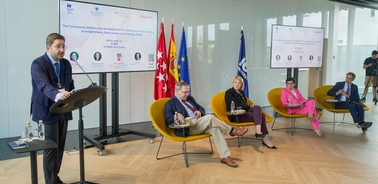The 2023 Transatlantic Conference explores the new era for Europe-US cooperation in tech, defense, energy and strategic foresight

The third edition of this international conference takes places under the theme “Is the Transatlantic Relation Back from the Dead, and for What?”
The new era for Europe-US cooperation in technology, defense and security, energy, and strategic foresight will lie at the heart of the debate at the Transatlantic Conference, an event co-hosted by IE School of Politics, Economics, and Global Affairs (SPEGA), Johns Hopkins School of Advanced International Studies (SAIS), Sciences Po Paris School of International Affairs (PSIA), and Yale University Jackson School of Global Affairs. The 3-day gathering, inaugurated today, will take place at the IE University campuses in Madrid and Segovia.
Three years after the last Transatlantic Conference, this third edition is being held under the theme “Is the Transatlantic Relation Back from the Dead, and for What?”
At the public opening of the conference, Manuel Muñiz, Dean of IE School of Politics, Economics, and Global Affairs, highlighted: “The Russian invasion of Ukraine in 2022 has clearly re-energized transatlantic ties and led to unprecedented Europe-US cooperation on coordinated sanctions on Russia and military support for Ukraine. It has also highlighted the importance of cooperation on trade and technology.”
Questions remain on what the objectives of this rebooted relationship should be, in a world where the US’ status of superpower is challenged by China, and Europe is still defining its role in the global arena.
“Cooperation is vital to addressing these challenges, particularly in a moment when the global order is rapidly shifting. In this spirit, this conference will address areas of friction in the transatlantic partnership—including industrial policy, a shared vision for NATO’s mission, and the rise of China—to maintain the cooperation necessary for a stable global security framework and effective climate change mitigation,” said Jim Levinsohn, Dean of the Yale University Jackson School of Global Affairs.
On the US-EU global diplomatic strategy, Arancha Gonzalez Laya, Dean of the Paris School of International Affairs (PSIA) at Sciences Po, declared: “This is the time for the EU and US to partner with countries in the South to address the many issues that require international cooperation from climate change to debt stress or international trade. A world of few ‘haves’ and a multitude of ‘have not’ is not only unfair. It also unstable and ultimately unsafe”.
“The transatlantic partnership is fundamental to global peace and prosperity,” added James B. Steinberg, Dean of Johns Hopkins School of Advanced International Studies (SAIS). “In a dynamic and rapidly evolving world, our shared values and habits of cooperation are essential to meeting the challenges and opportunities of the 21st century. Johns Hopkins SAIS is proud to play a part in convening leading thinkers and practitioners to help shape the future of this vital relationship.”
One year after the Madrid NATO Summit, participants including government officials, journalists, distinguished faculty, and corporate executives from across the globe, will discuss these important questions for the (re)definition of the global order.